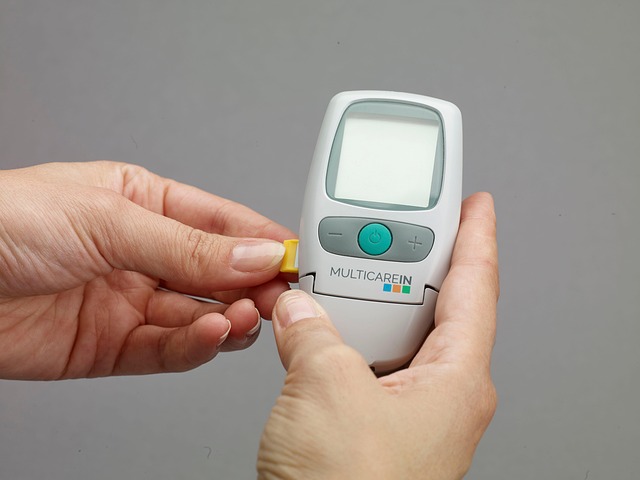Vitamin B12 deficiency is a common but overlooked health issue in the UK, requiring early recognition of symptoms like fatigue, memory problems, and balance difficulties. The UK Standard Thyroid Blood Test can detect B12 deficiency through elevated homocysteine or low B12 levels. Understanding total and active vitamin B12 levels (140-900 pg/mL) helps diagnose the condition, which impacts nerve health and red blood cell production. If results show low active B12 levels below 200 pg/mL, consult a healthcare provider for tailored treatment to address nutrient insufficiency.
“Vitamin B12 deficiency is a common yet often overlooked health issue, potentially leading to severe neurological and cardiovascular problems. This comprehensive guide delves into the detection methods, particularly through UK Standard Thyroid Blood Tests, which offer valuable insights into overall health. Understanding the symptoms and risks associated with B12 deficiency is crucial for timely intervention.
We’ll explore how these blood tests can identify deficiency, interpret results, and highlight what the numbers reveal about your health, empowering you to take charge.”
- Understanding Vitamin B12 Deficiency: Symptoms and Risks
- Uncovering the Role of UK Standard Thyroid Blood Tests
- Interpreting Test Results: What Do the Numbers Mean?
Understanding Vitamin B12 Deficiency: Symptoms and Risks
Vitamin B12 deficiency is a common yet often overlooked health issue in the UK, with potential risks to overall well-being. Recognising the symptoms early on is crucial for prompt treatment and management. Deficiency occurs when the body doesn’t have enough vitamin B12, which is essential for maintaining healthy nerve cells and creating red blood cells.
Common signs include fatigue, weakness, memory loss, and balance issues. It can also lead to anaemia, causing pale skin, shortness of breath, and a faster heart rate. In the UK, a standard thyroid blood test may indicate B12 deficiency if it shows elevated homocysteine levels or low B12 values, highlighting the importance of regular screening, especially for at-risk individuals.
Uncovering the Role of UK Standard Thyroid Blood Tests
In the quest to uncover a Vitamin B12 deficiency, healthcare professionals often turn to comprehensive blood tests, including the UK Standard Thyroid Blood Test. This test plays a pivotal role by providing crucial insights into the body’s metabolic functions and hormone levels, which are intricately linked to overall health, including vitamin absorption. By assessing various thyroid hormones like T3, T4, and TSH (Thyroid-Stimulating Hormone), this test offers a snapshot of the thyroid’s activity, enabling doctors to identify potential imbalances that may impact nutrient absorption, including Vitamin B12.
The UK Standard Thyroid Blood Test acts as a gateway to understanding the intricate interplay between thyroid health and nutritional status. Imbalances in thyroid hormones can lead to symptoms like fatigue, cognitive issues, and neurological problems, which are also indicative of Vitamin B12 deficiency. Thus, this test serves as a vital tool in differentiating between these conditions, ensuring accurate diagnosis and personalized treatment plans for individuals suspected of having a Vitamin B12 deficiency.
Interpreting Test Results: What Do the Numbers Mean?
When interpreting your vitamin B12 deficiency test results, understanding what each number represents is crucial. The UK Standard Thyroid Blood Test typically includes measurements for total vitamin B12 levels, as well as the percentage of those levels that are active and available for use by your body. A normal range for total vitamin B12 is usually between 140-900 picograms per milliliter (pg/mL). However, this can vary slightly between labs, so it’s always important to check with your healthcare provider for their specific reference ranges.
The active form of vitamin B12, known as methylcobalamin or holotranscobalamin, is what your body actually utilizes. Levels below 200 pg/mL may indicate a deficiency, as this active form plays a vital role in maintaining nerve health and producing DNA. If your test results show low levels of active vitamin B12, further investigation and potential treatment options should be discussed with your healthcare provider to address the underlying cause and ensure adequate nutrition.
In light of the above discussions on vitamin B12 deficiency and the pivotal role played by the UK Standard Thyroid Blood Test in its detection, it’s clear that awareness and early intervention are key. Understanding symptoms, recognizing risk factors, and interpreting test results empower individuals to take charge of their health. By regularly monitoring B12 levels, especially for at-risk groups, we can prevent potential harm and ensure optimal well-being.
